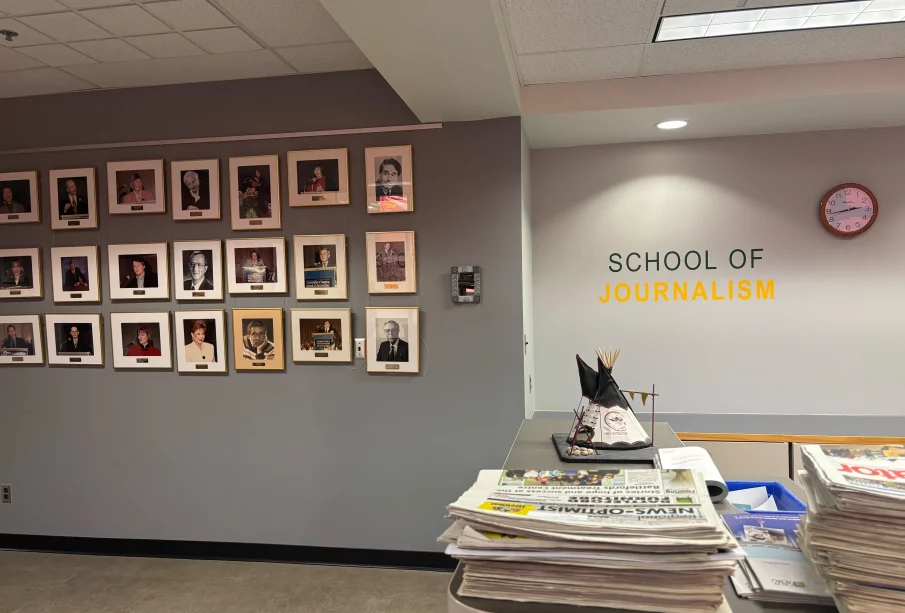Students and faculty reflect on changes in the new Journalism, Media and Communications program.
The University of Regina’s School of Journalism (J-School) reopened in Fall 2024 after suspending admissions for a year due to dwindling enrollment numbers, lack of funding, and limited staff. Students who were already enrolled in the J-School, or awaiting enrolment faced significant difficulties following this pause.
Effect on students
“With another semester of classes, I was very apathetic towards my studies. The shutdown caused me to take a year off. I worked a couple jobs that I definitely didn’t like, to stay busy,” said Mason Elford.
Deborah Adedayo, an international student from Nigeria and third-year journalism student, was first enrolled in the Media, Art and Performance (MAP) program, believing it offered journalism courses. She hoped to transfer to the J-School when she realized MAP was not the right fit for an aspiring journalist, but the program had already shut down.
Adedayo said, “I was devastated, sad, and emotional. It was a matter of my passion and that meant I had to transfer schools, basically start fresh.”
Before the shutdown, the J-School required two years of pre-journalism courses before students could enter full-time journalism classes, which was challenging for working parents and part-time students.
Addressing the old curriculum, Mitch Diamantopoulos, the current department head of the J-school, said, “In a lot of ways that is a great formula, and it turned out some superb journalists. But it’s important that the program should be accessible.”
Addition of Communications
Before reopening, the J-School realized its need for significant changes to the program and its content. This resulted in them adding a communications focus to the program in order to satisfy the rising number of journalists going into the communications industry.
This decision has had mixed reviews from the students.
Elford said, “ I believe this is extremely important as many J-School alumni have told me that they wound up taking long-term positions in communications.”
On the other hand, Adedayo is worried that a communications presence might be undermining the journalism side of the program. She thinks the current program is more inclined towards communications.
Ethan Jasper, a second year journalism student said that journalism itself is a part of communications, “We are in communications, whether we like it or not, we just have the luxury of being a little more righteous and ethical.”
Jasper says that journalists interact with people in communications fields frequently. Hence, journalism students should be trained to be able to read between the lines and navigate media-trained answers.
Faculty and staff
Before concerns of shutting down occurred, the J-School had a decent number of staff under their belt. There were six and a half full-time faculty members and a full-time department secretary. Leading up to and after the shutdown, that number has reduced to two full-time faculty members and few sessional instructors.
When asked about the current staff, Diamantopoulos said, “A great painful question. Five years ago, it was a robust program; we were able to do a lot of heavy lifting with specialist’s instruction. But we have gone from 6.5 to 2. So, we’re in a vulnerable phase.”
The sessional instructors include experienced journalists like Darrel Davis, who has spent years in the journalism industry working with both newspapers and broadcast media.
Students’ experience with both current permanent staff and sessional instructors has been nothing but positive.
“It’s really encouraging as a journalism student, when you don’t have one bad professor,” said Jasper. “I’ve gained experience and learned so much from every single one of the faculty members I’ve interacted with.”
Elford mentioned, “I have always felt I am treated fairly, and my success is a top priority.”
Adedayo used to visit the journalism department frequently during the shutdown to gather information about the new program where her concerns were well-heard.
Her experience was unchanged after starting J-school, “I literally go to the faculty, to make sure I’m still on the right track and taking the right classes. So, I feel like they are a very good support system.”
Davis, who taught a news-writing class for five-years before the shutdown and is back as a sessional teacher for the new program, said, “Mitch and Guenni (Gennadiy Chernov, associate professor at the J-school) are only tenured employees, there is a lot on their shoulders. They have loyal and talented people there, but as in any business, we could use more of them.”
I think we won the first round, but with bloody noses and with some bruises to show for it. – Mitch Diamantopoulos, Department Head, School of Journalism
What changes have been made in the program apart from communications?
In the J-School’s new curriculum, digital media training has replaced the print. Introductory classes focusing on Indigenous issues and public relations are also now a requirement for students. There has been a deduction of certain classes, like photojournalism and interviewing skills. However, students say these classes are vital to prepare them for the evolving journalism industry.
Elford said, “Without these courses, students will be less well-rounded in the field”
Adedayo said, “We’re literally going to train ourselves at the end of the day.”
Jasper highlighted, “There’s a lot of people with social anxiety, and would be interacting with people who are professionally trained on how to speak and give an answer. So, you have to be professionally trained on how to ask the question.”
Jasper aspires to become a photojournalist. He hopes these classes are brought back and taught by professionals in a classroom setting.
To help remedy this gap, Davis brought a photojournalist as a guest lecturer during his writing classes for students to learn the basics.
Internship
The one-semester paid internship is the jewel of the journalism program. The University of Regina is the only school in Canada to offer it.
Davis said, “These students go into a job and get hired full time after they graduate. There are so many places that want journalism students to work for free. But the UofR [University of Regina] has always established a paid internship program.”
Elford said, “My biggest concern for the J-School is that there aren’t yet a good amount of internship opportunities for students.”
Both Davis and Diamantopoulos mentioned that the downsizing in the journalism industry has led to fewer media outlets hiring interns.
Diamantopoulos said, “The idea would be to give people a balanced experience. Now that’s not always possible and in the current circumstances, that’s going to be our biggest challenge […] We have some schemes, which we will pursue energetically in the next few weeks and months.”
What do students expect in the future and are they confident in the program?
Some students believe there are missed opportunities at the university like the radio station, podcast studio, green screen, and the students’ newspaper. There is a debate on whether students can take on journalism and communication jobs after graduating.
Adedayo said, “I feel like it’s a foundation, but it’s not really going to make me solid. So obviously, I need more additional learning.”
While Jasper and Elfrod had different thoughts.
Elfrod said, “I will be prepared adequately for a career in the journalism or communications field.”
Jasper said, “If I successfully make it through university, build the right relationships and gain experience, I think I will be very prepared to join any part of the journalism industry.”
Despite the speculations and differing opinions, only time will tell how effectively the J-School has prepared its students for the ever-changing world of journalism.







